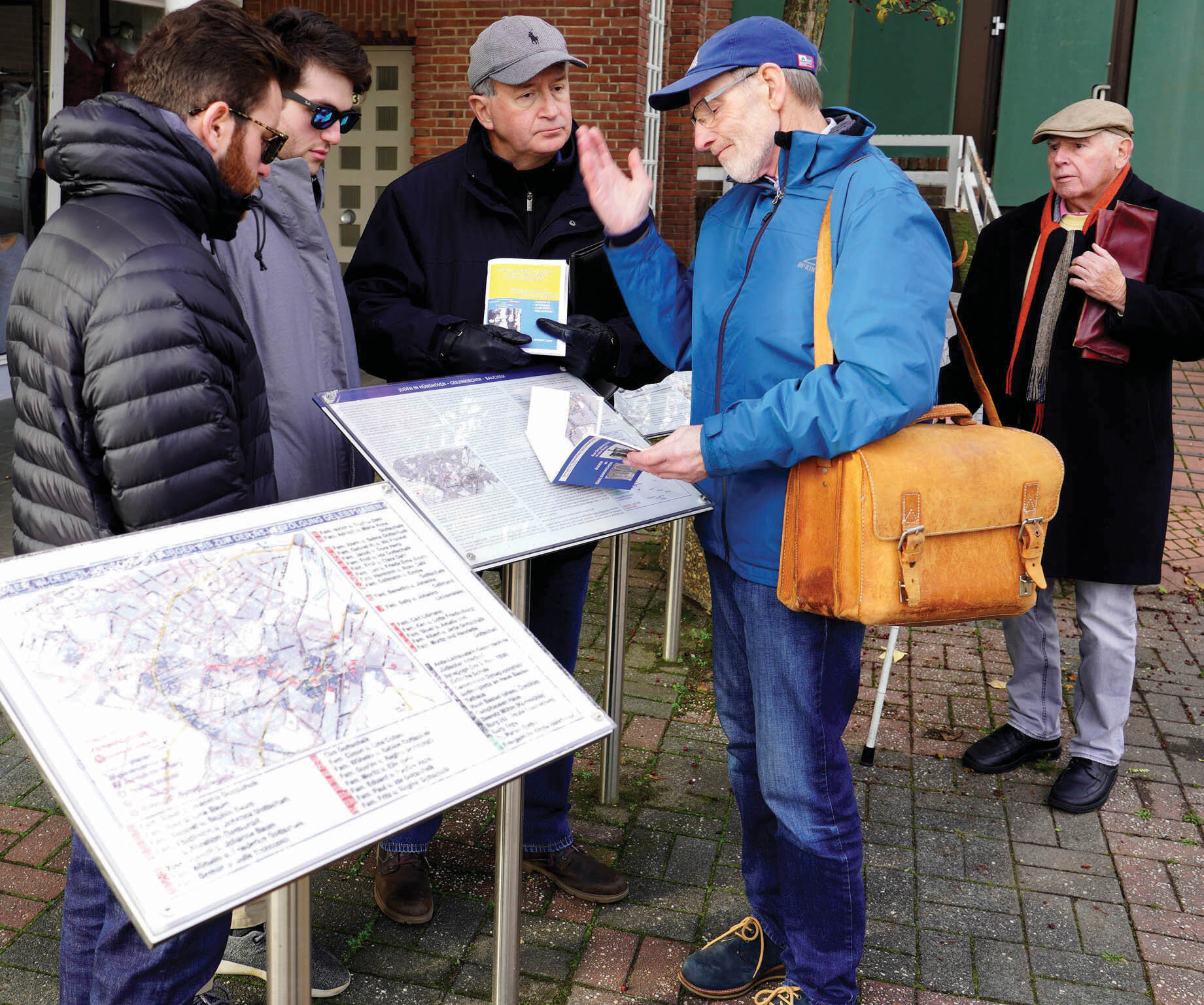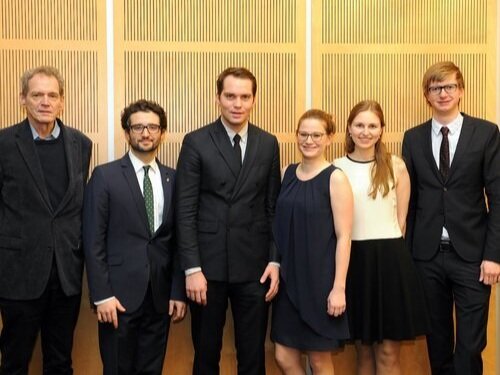Obermayer German Jewish History Award
“They were shocked…and that was the starting point”
Karl-Heinz Nieren introduces students to a stark truth close to home
Karl-Heinz Nieren spends much of his time researching the past. But as a retired high school teacher, he knows that an important aspect of his work is the impact it has both today and into the future.
For decades after World War II, few people knew about or acknowledged the rich Jewish legacy of Nieren’s hometown of Geilenkirchen. The North Rhine-Westphalian town had served for centuries as a center for Jewish life in the region north of Aachen. Then, in the 1970s, Nieren began taking his students to visit Geilenkirchen’s Jewish cemetery to commemorate Kristallnacht.
“They were shocked,” he recalls. “You could read the names of the Geilenkirchen families on the graves, on the stones, and that was the starting point. We talked about the community, the former synagogue, the fates of the town’s former Jewish citizens, and so it developed—it was the beginning.”
Nieren has worked tirelessly, and with remarkable results, restoring Geilenkirchen’s Jewish history to the public consciousness. He co-founded the Geilenkirchen Remembrance Initiative (Initiative Erinnern Geilenkirchen) to promote religious and cultural tolerance, discourage discrimination, and educate citizens about the destruction of the town’s Jewish community. Working alongside his pupils, he helped clean and maintain the Geilenkirchen Jewish cemetery. He helped install nearly 100 stumbling stones recognizing the former homes of Geilenkirchen’s murdered Jewish inhabitants. After exhaustive research, he created two publications, Jewish Citizens of Geilenkirchen During the Nazi Era in 2013 and Jews in Geilenkirchen: Searching for Traces in the Town (Juden in Geilenkirchen—Auf Spurensuche in der Stadt) in 2014.
Nieren frequently welcomes the descendants of Geilenkirchen’s former Jewish residents, guiding them to family homes and other Jewish landmarks. In 2019 alone, Nieren hosted 31 people from five separate families.
As a high school teacher, he invited witnesses of Nazi atrocities into his classroom at Anita Lichtenstein Comprehensive School to speak about what they saw. Since his retirement in 2007, Nieren has served as the primary resource for high school students across the region who are studying the Holocaust, frequently bringing his guests to Geilenkirchen schools to speak with students.
Says Pascal Cremer, faculty advisor for the [city’s] Saint Ursula high school’s historical remembrance work, “Multiple former students have told me that they consider the visit of Geilenkirchen Jewish survivors… a central experience from their school days. These experiences and the encounters with local Jewish history have a lasting influence on the children and young adults. They tell their families and friends about it, they keep alive the remembrance, and they experience the positive effects of compassion and mutual tolerance.“
Nieren was born in Aachen in December 1942 while his father was fighting on the Russian front. After the war, the family moved 20 kilometers north to a small village outside Geilenkirchen, five kilometers from the Dutch border. Following Kristallnacht, in November 1938, many Jews from Geilenkirchen tried to cross into Holland but were refused entry; they were later imprisoned in a Jewish internment house and most of them perished in the war.
As a child, Nieren’s earliest contact to Jewish history came through his father’s friend, Hermann Wassen, who in the 1950s worked to establish contact with some of Geilenkirchen’s former Jewish residents living in the U.S., Israel, Holland, and elsewhere. Wassen assembled some of the region’s earliest information about the pre-War Jewish community “By that way I came to be interested in Jewish history,” says Nieren, who maintained a lifelong friendship with Wassen and invited him often to speak with his students about the past. “Without the work of Mr. Wassen, I wouldn’t have done what I have.”
As a student in the 1960s, Nieren visited a friend in Frankfurt who brought him in contact with Jews living in the city. Those encounters further spurred him to investigate his region’s history. But it wasn’t until the following decade, when Nieren led his students to explore Geilenkirchen’s Jewish cemetery, that he embarked on the project of Jewish remembrance that would recast his life.
Throughout his 16 years teaching at the Anita Lichtenstein Comprehensive School—named after a nine-year-old Jewish girl from Geilenkirchen who was killed in 1942 at Majdanek concentration camp in Lublin—Nieren invited witnesses of Nazi atrocities into the classroom to speak about what they saw. It wasn’t always an easy task. Even in the early 1990s, Nieren recalls, many residents still didn’t want to discuss their town’s dark past. “It was very difficult in that time to talk about it. There were a lot of people who had bought Jewish properties at a very low price, so they didn’t want to remember them.”
Today, in retirement, Nieren continues to impact young people, serving as the primary resource for high school students across the region studying the Holocaust. In 2017, Nieren provided guidance and research assistance to four high school students who won a national competition for their essay about the life of former Jewish resident Ilse Dahl and the Nazis’ destruction of the community. And in 2018, Nieren helped college students at the Rheinish-Westphalian Technical University Aachen (RWTH Aachen) produce a project about the ties between religion and government.
In 2018, Nieren helped organize an exhibition by the London photographer Marion Davies, Absence and Loss: Holocaust Memorials in Berlin and Beyond, at a Geilenkirchen school. The show is one more way Nieren has helped profoundly change the way his town views its past. “All the schools in the city are working on the history of the Jewish community, the history of the Holocaust, the history of concentration camps,” he says. “A lot of work is being done.”
Now, he says, it’s up to the next generation to carry on the work of remembrance and keep the memory of Geilenkirchen’s Jewish past alive. Nieren still wakes up each day with a seeming single-minded purpose: to investigate and educate. But, he says, “it’s better that the youth will do this work in the future.” He adds, “The Dahl family has been here since 1700, the Gottschalk family since 1775, the Baum family since 1856, and there are a lot of other families that aren’t so big as these who have been here since the 18th and 19th centuries. We must give our former Jewish citizens back their history, their roots. We have to do all that we can so their important history in this town will not be forgotten.”
— Obermayer Award recipient 2020
STUDENTS REACHING STUDENTS
When a handful of ninth graders from Berlin met Rolf Joseph in 2003, they were inspired by his harrowing tales of surviving the Holocaust. So inspired that they wrote a popular book about his life. Today the Joseph Group helps students educate each other on Jewish history.
“I SPEAK FOR THOSE WHO CANNOT SPEAK”
Margot Friedländer’s autobiography details her struggles as a Jew hiding in Berlin during World War II. Now 96, she speaks powerfully about the events that shaped her life and their relevance today.
USING STORIES TO FIGHT BIGOTRY
A good story can touch us. Hans-Dieter Graf, his wife Martina, and his sister Gabriele Hannah, write books and tell stories that shed a light on our shared history.




